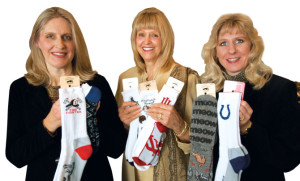By Diana Lambdin Meyer
As a fifth-grade teacher in Helmsburg, Ind., Sharon Rivenbark was determined to create ways to help her students learn, feel good about themselves and become successful.
Some friends suggested Tim learn a craft such as basket weaving, but nothing appealed to Rivenbark until she came across a 1930s-era sock-knitting machine. Living near the craft-art community of Nashville, Ind. (pop. 825), Sharon knew that successful businesses were ones where shoppers could watch products being made, and nobody in Nashville was making socks.
With a $1,300 loan from her parents, Rivenbark purchased the sock-knitting machine and started a business, which she named For Bare Feet, in a little shop in downtown Nashville for her son. Instead of making plain, white socks, however, the crafty schoolteacher created designs, such as apples, pumpkins, cats and butterflies, for Tim to knit into the socks.
The business soon became a family affair, and after each school day ended, she, Tim and his four sisters—Kelly, Tina, Sheree and Mandy—would converge on the shop to make socks. By 1984, the novelty socks were a hit, and the company landed its first wholesale account, kiosks at local shopping malls, and booths at apparel and gift markets around the nation. Sharon made the difficult decision to leave teaching and work full-time with Tim.

David Snodgress Sharon (center) with daughters Tina and Kelly at company headquarters in Helmsburg, Ind.
That same year For Bare Feet began adding official sports logos to its socks. “A friend worked at the bookstore at Indiana University and encouraged us to get licensed by the NCAA, and that was a major breakthrough,” Rivenbark says. Today, For Bare Feet socks, adorned with official college sports logos, are sold in university bookstores across the United States.
“Tim was probably most proud of the IU socks,” says his sister, Kelly Baugh, 36, the company’s vice president of sales, who worked tirelessly for 18 months to negotiate a licensing agreement with the NFL. “Tim was in the front of my mind and heart, encouraging me every step of the way.”
The company subsequently landed exclusive licensing agreements with other major sporting organizations, including the NBA, NHL and MLB.
“My mother expects your personal best at whatever your day offers,” Baugh says. “She’s a very kind person, but she has a spine of steel and is very determined in a positive way. That’s what she taught all of her kids.”
After Tim died in 1987, there was no question in Rivenbark’s mind that For Bare Feet would continue on and be successful. “I knew the company had to continue,” she says. “It’s all I had left of my son.”
Today, the company is headquartered in the former Helmsburg High School, and its novelty socks are sold in retail locations across North America. Rivenbark’s daughter Tina serves as For Bare Feet’s vice president of operations, while Sheree and Mandy have gone on to work for the public schools. All four of her sons-in-law work for the company, and some of her 11 grandchildren help out during the summer.
In a bright, spacious addition to the school building, around 150 employees make socks on a variety of modern machines. It takes about two and a half minutes to knit a single sock. The socks are then washed, ironed, tagged and bagged.
The company also manufactures headbands, wristbands and flip-flops, but with each product, the goal is as simple as when Sharon and Tim knitted the first pair of socks together: to provide a working environment where people prosper, grow and feel good about themselves.
“When you have that,” Baugh says, “you have a good product and we all succeed.”
Request Info